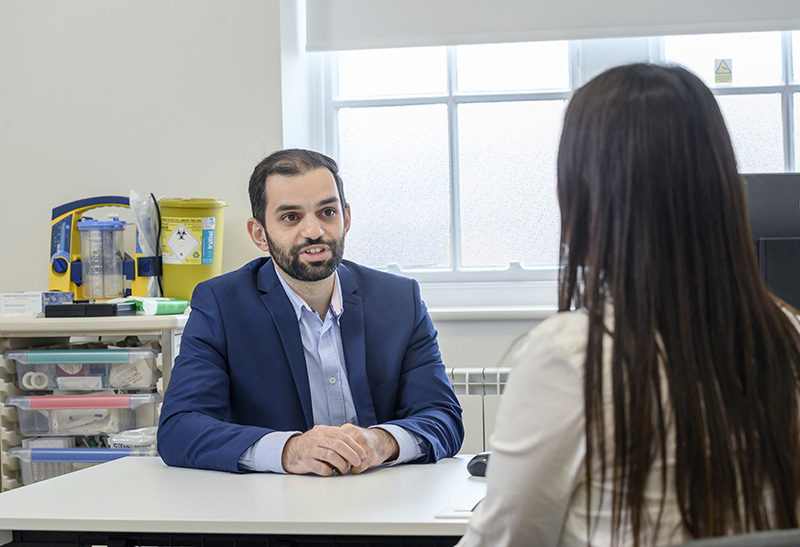Contents
Rheumatoid Arthritis

Rheumatoid arthritis causes inflammation in the joints which can cause joint pain, stiffness and tenderness. Discover the causes, symptoms, diagnosis and management of this condition.
What is Rheumatoid Arthritis?
Rheumatoid arthritis (RA) is a long-term autoimmune condition that leads to joint inflammation, commonly resulting in pain, stiffness, swelling, and reduced mobility.
Unlike osteoarthritis, which typically results from wear and tear, RA involves the immune system mistakenly attacking the joint lining (synovium). Over time, this can cause damage to cartilage and bone, potentially leading to joint deformity if left untreated.
RA can affect various joints throughout the body, with the hands, wrists, knees, ankles, and feet being the most frequently impacted.
Causes
While the exact cause of RA is still unknown, several factors are believed to contribute to its development:
- Genetics: Some people inherit genes that may make them more prone to developing RA, though having these genes does not guarantee onset of the condition.
- Immune system errors: RA occurs when the immune system attacks healthy joint tissue, leading to chronic inflammation.
- Environmental factors: Smoking is a major risk factor. Other triggers may include certain infections or environmental exposures.
Who is At Risk from Rheumatoid Arthritis?
RA can develop in anyone, but some groups are more susceptible:
- Women are significantly more likely to be affected than men.
- Most cases begin between the ages of 40 and 60.
- A family history of RA may increase risk.
- Lifestyle factors such as smoking and being overweight also play a role.
Symptoms
RA symptoms often begin gradually and may vary from person to person. Common signs include:
- Joint pain affecting multiple joints, typically on both sides of the body.
- Morning stiffness that lasts more than 30 minutes.
- Swollen, tender joints that may feel warm to the touch.
- Reduced joint function, making everyday tasks more difficult.
- Fatigue and a general feeling of being unwell.
- Low-grade fever, especially during flare-ups.
Diagnosing Rheumatoid Arthritis
A diagnosis of RA usually involves a thorough assessment, which may include:
- Clinical evaluation: A review of symptoms, personal and family medical history, and a physical examination of affected joints.
- Blood tests: These help detect inflammation (e.g. CRP, ESR) and autoantibodies like rheumatoid factor (RF) or ACPA.
- Imaging: X-rays, MRI, or ultrasound scans may be used to examine joint damage or inflammation, even in early stages.
Managing Rheumatoid Arthritis
Although there is no cure for RA, many treatments can help control the condition and improve quality of life:
Medications
- DMARDs (Disease-modifying antirheumatic drugs): These are the foundation of RA treatment and help slow the progression of the disease.
- Biologics: Targeted treatments that interrupt specific immune system processes.
- Corticosteroids: Used to quickly reduce inflammation, especially during flare-ups.
- Pain relief: Anti-inflammatory medications and painkillers can help manage symptoms.
Therapies
- Physiotherapy: Helps maintain joint flexibility, muscle strength, and mobility through guided exercises.
- Occupational therapy: Offers strategies to perform daily tasks more easily, often using adaptive tools or techniques.
Lifestyle Support
- Healthy weight: Maintaining a balanced weight eases joint pressure and can reduce inflammation.
- Anti-inflammatory diet: Eating a nutritious diet rich in omega-3s, vegetables, and whole grains may help reduce flare-ups.
- Exercise: Regular, low-impact activities like walking, swimming, or yoga can enhance joint health and mobility.
- Rest and sleep: Good quality sleep is important for managing fatigue and pain.
- Stress management: Relaxation techniques, mindfulness, or counselling can help lower stress levels, which may benefit RA symptoms.
- Quitting smoking: One of the most important lifestyle changes for reducing RA severity and progression.
Additional Support Strategies
- Heat and cold therapy: May ease pain and stiffness in affected joints.
- Assistive aids: Devices like braces or walking supports can help you stay mobile and independent.
- Peer support: Connecting with others living with RA can provide emotional reassurance, practical advice, and shared understanding.
Arranging To Visit A Private GP

To discuss any symptoms that could be an indication of rheumatoid arthritis make an appointment with one of our private GPs. Appointments are available to everyone and can often be booked for the same day. There is no need to be registered with our hospital, or live locally.
If you have insurance which covers a GP visit, we can in most cases invoice the insurer directly. Where you are paying directly, the cost for a 30 minute consultation is £100.
Any additional costs will always be discussed. They could apply if you are referred for an MRI scan, or to a consultant, or for other agreed decisions to support your health.
20 April 2025


